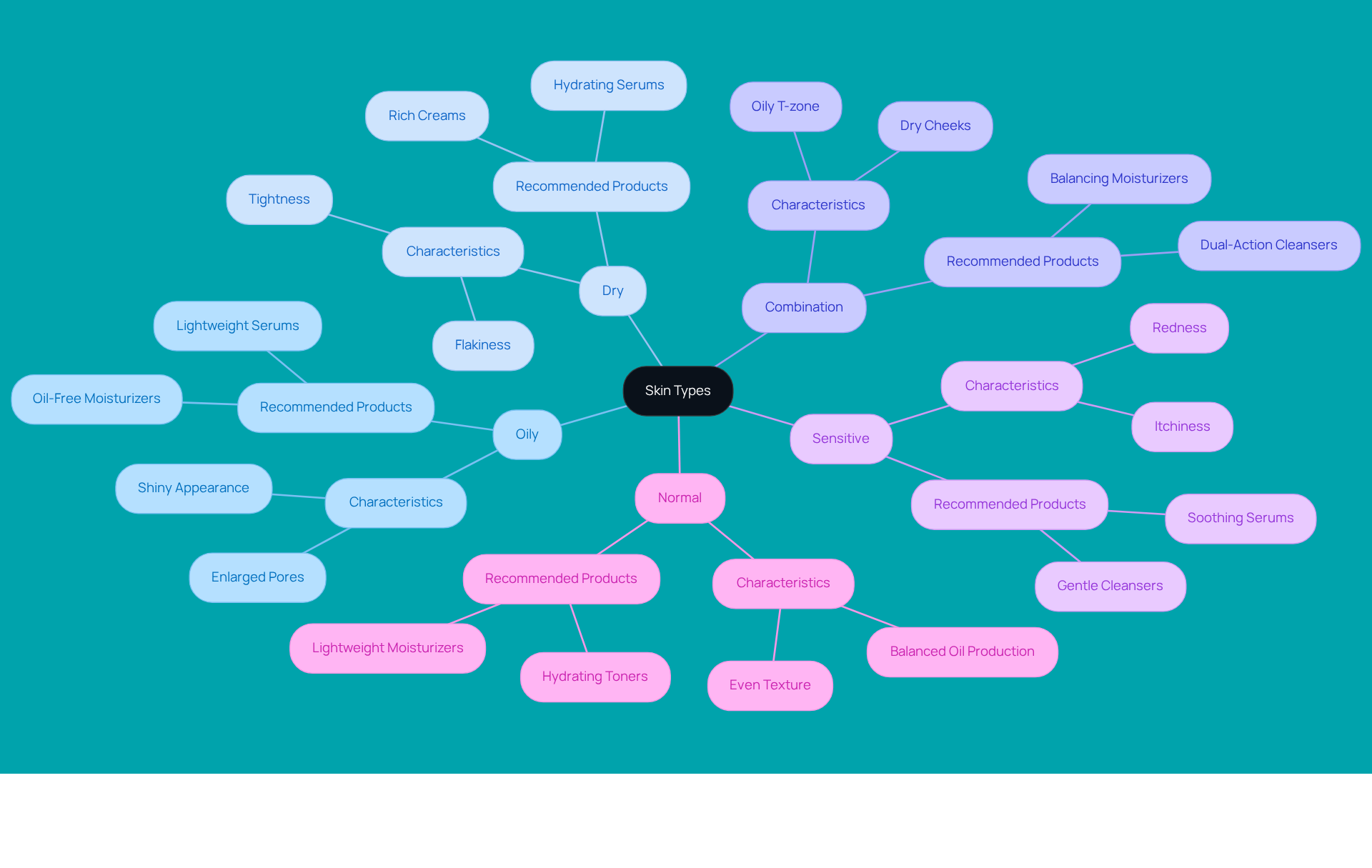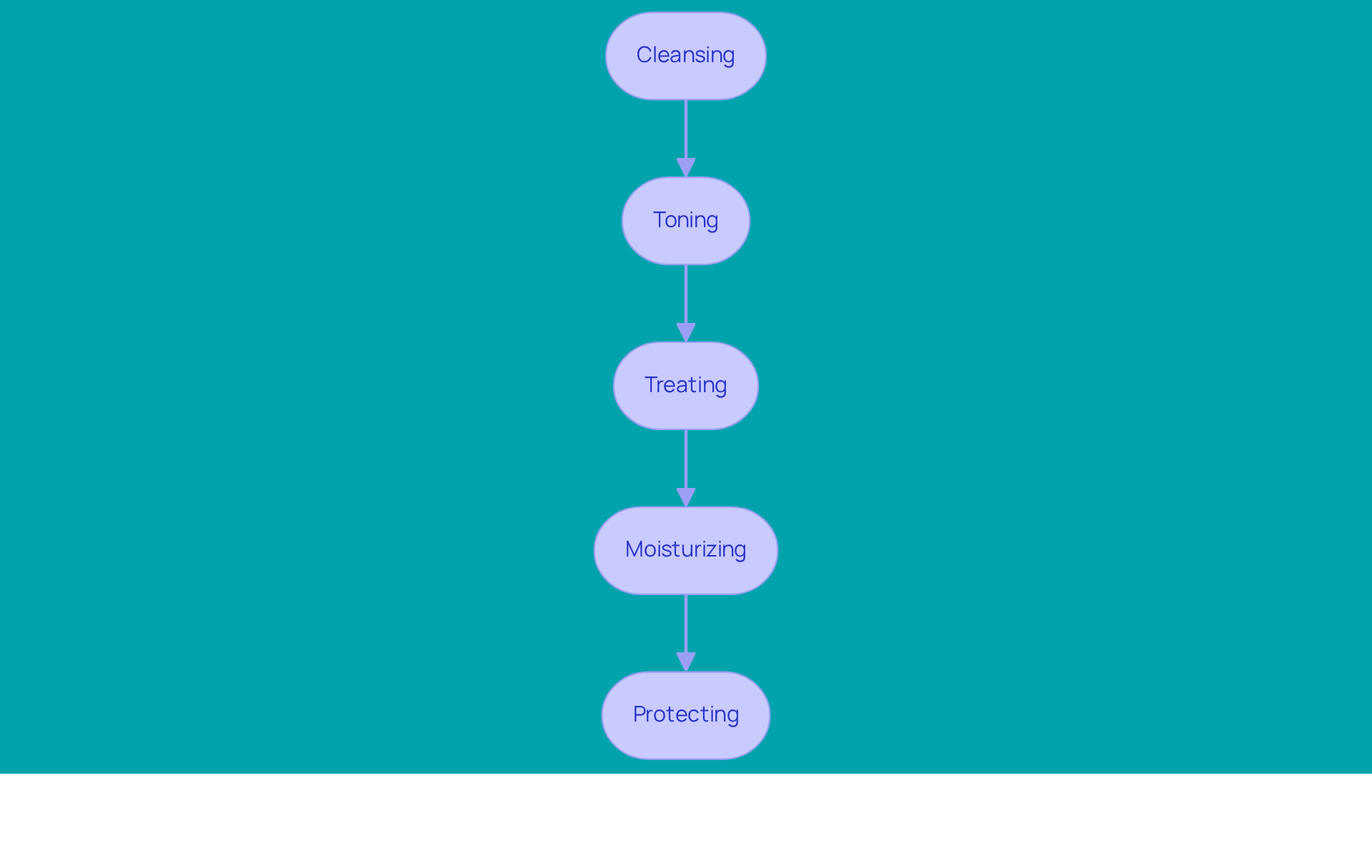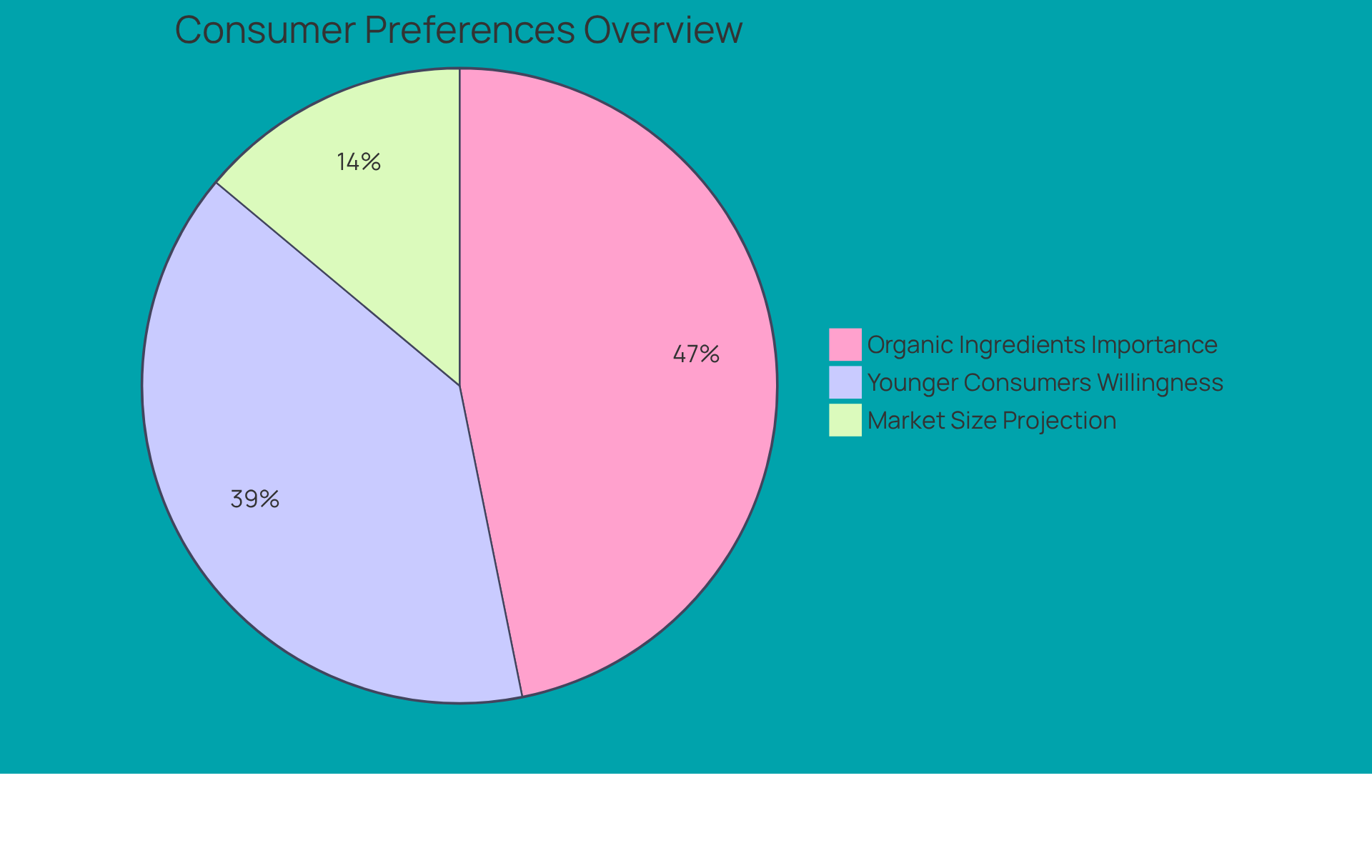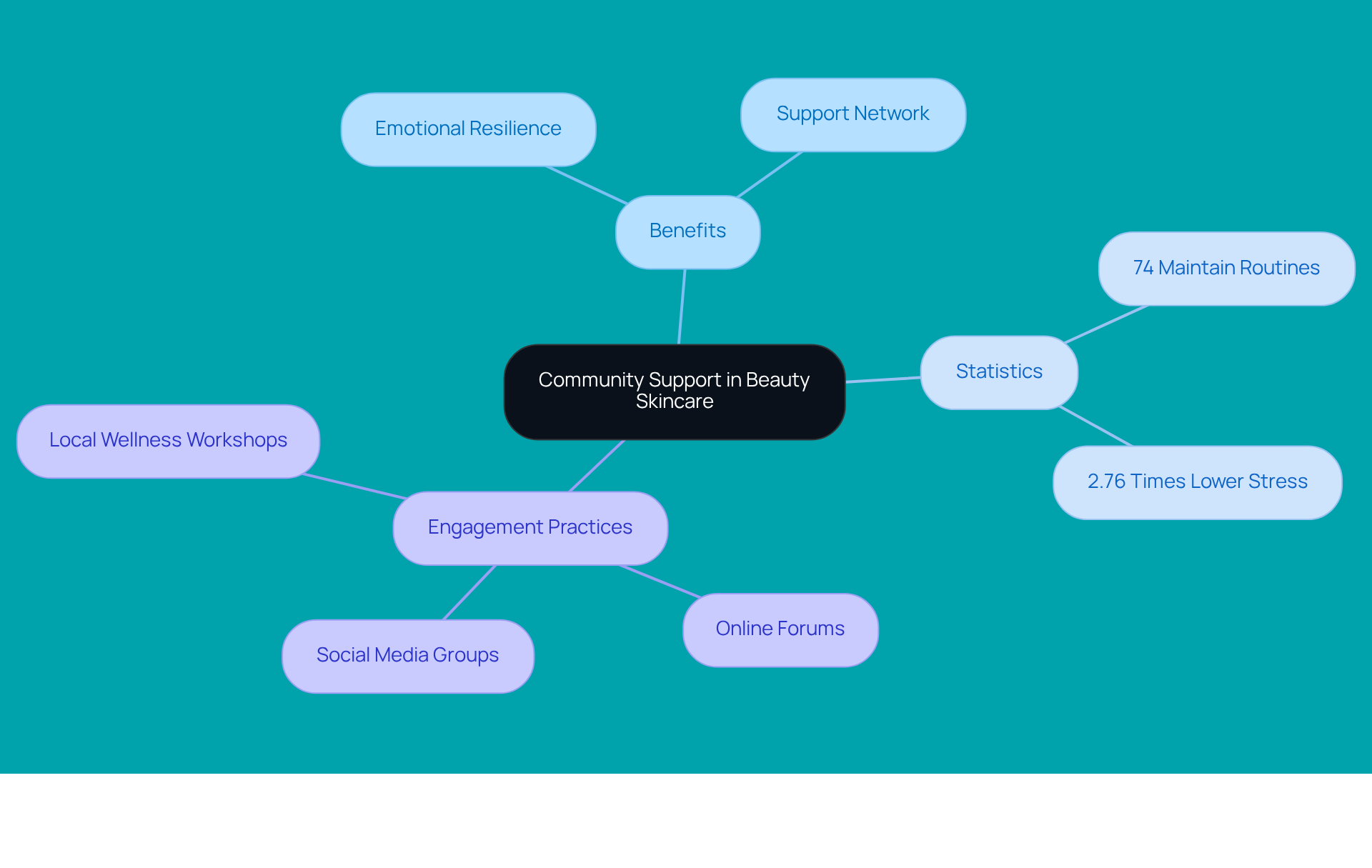Overview
Imagine a skincare journey that truly understands your unique needs. The article shares four essential practices for effective beauty skin care that can transform your routine:
- Identifying your skin type
- Establishing a structured skincare regimen
- Choosing high-quality ingredients
- Engaging with community support
These practices are not just steps; they empower you to tailor your skincare to what works best for you. By enhancing product effectiveness, you can feel more confident in your choices. Plus, connecting with others in beauty communities fosters emotional resilience through shared experiences. Together, let’s embrace these practices and take the next step in nurturing your skin and spirit.
Introduction
Understanding the nuances of skincare can feel overwhelming, can't it? Yet, it is essential for achieving a radiant complexion. With countless products and trends flooding the beauty market, you might be wondering how to navigate this landscape. The key to effective skincare lies in adopting a structured approach that caters to your individual needs.
In this article, we will explore four essential practices that empower you to tailor your skincare routine. This way, you can enhance your natural beauty while promoting your overall well-being.
But imagine what happens when the wrong products are used, or when we neglect the importance of community support in our skincare journeys? Together, let’s delve into the solutions that can make a real difference.
Identify Your Skin Type for Tailored Care
Understanding your complexion category is the cornerstone of effective skincare. We all want to feel confident in our skin, and recognizing whether your complexion is oily, dry, combination, sensitive, or normal can help you achieve that. Each type has its unique traits that determine what it needs for proper care. For example, if you have an oily complexion, lightweight, oil-free products can work wonders for you. Conversely, those with dry skin may find richer, hydrating formulations to be more beneficial. To identify your complexion, you can easily conduct a simple test: wash your face and wait for an hour. If your skin feels tight, it likely indicates dryness; if it appears shiny, you may have an oily texture.
Identifying your skin type isn't just a matter of preference; it can significantly enhance the effectiveness of your skincare products and treatments. Did you know that nearly two-thirds of women misclassify their complexion? This misstep can lead to ineffective or even harmful product choices. Additionally, a staggering 71% of adults report having sensitive skin, reflecting a 55% increase over the past two decades. Dermatologists emphasize that understanding your complexion type is essential for crafting a personalized skincare regimen that caters to your specific needs. For instance, a tailored routine for sensitive skin may include gentle cleansers and soothing serums, while a regimen for combination skin could incorporate balancing products that address both oily and dry areas.
As noted by Skin Trust Club, 'Beautiful complexion requires commitment, not a miracle.' By taking the time to determine your complexion category, you empower yourself to make informed choices about your beauty routine, leading to a healthier, more radiant appearance. It's also important to recognize that one-third of individuals with skin conditions like acne and psoriasis experience emotional challenges such as anxiety and depression. This highlights the significance of , as it can play a crucial role in your overall well-being.

Establish a Structured Skincare Routine
Creating a structured beauty skin care regimen is essential for achieving a healthy complexion and involves several key steps:
- Cleansing
- Toning
- Treating
- Moisturizing
- Protecting
Start with a to effectively remove impurities while preserving your skin's natural oils. After cleansing, apply a toner to balance your skin's pH levels and prepare your complexion for the treatments to follow. Incorporate targeted serums or treatments that address specific concerns, such as acne or signs of aging. Remember, moisturizing is vital to lock in hydration, and daily sunscreen application is necessary to protect your skin from harmful UV damage.
Imagine the benefits of maintaining both a morning and evening routine to maximize your beauty skin care regimen. Consistency is key; while results may take time, research indicates that women typically wait nearly three months to evaluate the effectiveness of their products. As noted, "on average, women would try a beauty product for nearly 3 months to see if it works." Dermatologist Steven Nwe emphasizes the importance of early investment in your skincare routine, stating, "Investing early in the health of your dermis, with regular care, will not only better protect it from the harsh effects of winter, but also keep you looking and feeling your best throughout the year." Real-life examples show that individuals who follow a structured routine often experience visible improvements in texture and overall appearance, as supported by findings from the 'Clinical Benefits of Advanced Care Routine' study.
By committing to these beauty skin care practices, you can achieve significant improvements in the health and resilience of your complexion. However, be mindful of common pitfalls, such as choosing the right products for your skin type and avoiding over-exfoliation, which can lead to irritation. A comprehensive strategy for beauty skin care will ensure you optimize the benefits of your beauty regimen, and together, we can navigate this journey toward healthier skin.

Choose High-Quality Ingredients for Optimal Results
When selecting beauty skin care items, it’s essential to focus on premium components that cater to your unique skin type and concerns. Imagine selecting beauty skin care products that are enriched with natural and organic ingredients—these are often milder and more effective for your skin. For instance, hyaluronic acid is celebrated for its hydrating properties, while salicylic acid works wonders for treating acne. You might be wondering about the ; vitamin C, for example, can enhance your complexion and combat free radicals.
It’s important to steer clear of products laden with harsh chemicals, synthetic fragrances, or parabens, as these can lead to skin irritation. By researching ingredients and reading labels, you empower yourself to make informed decisions that elevate your beauty skin care routine. Together, we can embrace the shift towards beauty skin care that is cleaner.
Significantly, 74% of consumers view organic components as essential in personal care items, highlighting a growing inclination towards natural formulations. Furthermore, 62% of younger consumers, ages 18 to 29, are willing to invest more in certified personal care products with organic ingredients, showcasing a meaningful trend in this demographic.
The clean beauty market is projected to reach $22 billion by 2024, with a remarkable 33% increase in sales during the first half of 2021, driven by a significant shift towards sustainable and natural beauty solutions. By concentrating on these aspects, you can ensure that your beauty choices contribute positively to your overall health and well-being. Let’s make these mindful choices together, nurturing our skin and our selves.

Engage with Community Support for Enhanced Wellness
Participating in a community centered on beauty skin care and wellness can truly enhance your journey. Imagine joining online forums, social media groups, or local wellness workshops where you can share experiences, ask questions, and learn from others. Community members often provide valuable advice on effective products and offer unwavering support throughout your beauty skin care routine. Did you know that 74% of individuals maintain both a morning and evening beauty routine? This highlights a strong commitment to grooming practices that can be enriched through community interaction.
You might be wondering how this helps you personally. Research reveals that community involvement boosts emotional resilience, with individuals reporting 2.76 times lower odds of experiencing stress when they feel supported by their community. This and sustaining regular beauty skin care routines. Sharing your journey not only inspires others but also creates a ripple effect of encouragement and motivation within the community.
As wellness coaches often emphasize, engaging with beauty skin care communities can significantly elevate your overall wellness experience. Together, we can make this practice a vital part of your skincare journey, fostering a supportive network that empowers us all.

Conclusion
Understanding and implementing effective beauty skin care practices is essential for achieving a vibrant and healthy complexion. Imagine if you could recognize your unique skin type and establish a structured routine that truly works for you. By selecting high-quality ingredients and engaging with supportive communities, you can significantly enhance your skincare journey. This holistic approach not only fosters better skin health but also promotes overall well-being and confidence.
Key insights from the article highlight the importance of identifying your skin type to tailor your skincare regimen effectively. A structured routine—consisting of:
- Cleansing
- Toning
- Treating
- Moisturizing
- Protecting
is crucial for maximizing results. You might be wondering how choosing products with premium, natural ingredients can lead to optimal outcomes. Community support provides invaluable encouragement and shared knowledge, making the journey more enjoyable and effective.
Ultimately, embracing these essential practices can transform not only your skin but also your overall approach to self-care. Taking the time to understand your personal skincare needs and actively participating in supportive networks can lead to lasting improvements in both physical appearance and emotional resilience. Let’s prioritize these practices today and embark on a rewarding path towards healthier, more radiant skin together.
Frequently Asked Questions
Why is it important to identify your skin type?
Identifying your skin type is crucial because it enhances the effectiveness of your skincare products and treatments, allowing for a personalized skincare regimen that meets your specific needs.
What are the different skin types mentioned in the article?
The different skin types mentioned are oily, dry, combination, sensitive, and normal.
How can I determine my skin type?
To determine your skin type, wash your face and wait for an hour. If your skin feels tight, it likely indicates dryness; if it appears shiny, you may have an oily texture.
What are some product recommendations for different skin types?
For oily skin, lightweight, oil-free products are recommended. For dry skin, richer, hydrating formulations are more beneficial. Sensitive skin may require gentle cleansers and soothing serums, while combination skin could benefit from balancing products that address both oily and dry areas.
What percentage of women misclassify their complexion?
Nearly two-thirds of women misclassify their complexion, which can lead to ineffective or harmful product choices.
What recent trend has been observed regarding sensitive skin?
A staggering 71% of adults report having sensitive skin, reflecting a 55% increase over the past two decades.
How can understanding your skin type impact emotional well-being?
Understanding your skin type is significant because one-third of individuals with skin conditions like acne and psoriasis experience emotional challenges such as anxiety and depression, highlighting the importance of proper skincare for overall well-being.




